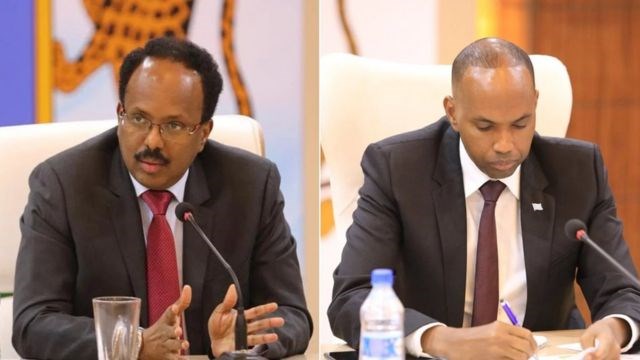By Mahamoud Salah
Friday - May 13, 2022

In their long repetitive speeches to MPs in their bid to win
the keys to Villa Somalia, both Mohamed Abdullahi Farmajo and Hassan Ali Kheyre
told stories of their nationalism and bogus successes to an unimpressed
audience. Farmajo and Kheyre, who were so close for almost three and half years
are now fighting over the same legacy of an administration that presided over
national division, vilification of the opposition and corruption.
This is not forgetting that soldiers loyal to both men openly
attacked opposition
leaders, including Abdirahman Abdishakur, while other soldiers opened fire on
innocent Somali people, including parents protesting against the government’s
move to send their children to Eritrea. In addition to the state-sponsored
violence perpetrated by Farmajo and Kheyre, their incompetence in addressing
insecurity had led to the worst Al-Shabaab attacks in the country, including
the Zoope terrorist attack, which had caused the largest number of victims of
terrorism in the world.
Somali businesses are paying more taxes to Al-Shabaab than
the federal government, and the people are even seeking justice from this
terrorist group because the government system has failed them. Where is
Farmajo’s 2017 pledge to eradicate Al-Shabaab in just two years? Where is the
compensation to victims of terrorism, which he blatantly promised? Or what
about Kheyre’s stunt of walking down a closed Makka Mukarama Road at night
followed by his bullet-proof cars and guards, pretending that it was safe for
ordinary citizens. These actions show Farmajo and Kheyre were united in
deceiving the Somali people from the beginning.
Abdikarim Muse Qalbidhagah is a lesson in the psyche of
Farmajo and Kheyre and an illustration of how dangerous they are. Qalbidhagah
is a decorated soldier who stands for the unification of the Somali
territories. The ONLF organisation of which he was a member has struggled in
Somalia’s independence to liberate the Somali territory in Ethiopia, which the
British colonialists illegally curved off. This history took Somalia to war
with Ethiopia in 1977. The ONLF and the Somali army suffered huge losses, but
the struggle for a united Somalia was never forgotten.
Farmajo claims to be a patriot and a nationalist, but his
actions to illegally extradite Qalbidhagah with the support of his then-Prime
Minister show that he would rather keep Ethiopia happy and sacrifice Somalia
nationals to achieve his political goals. This is far from nationalism and
diametrically opposed to what Somalia's forefathers stood for.
Farmajo speaks of an independent foreign policy but his
foreign policy has looked past Ethiopia, Eretria and Qatar. Farmajo isolated
Somalia from the world, and decided to call it an independent foreign policy.
The ordeal of Qalbidhagah was beyond comprehension for an
ordinary person. He was a serving Somali national army soldier who was
kidnapped, blindfolded, illegally detained and extradited into the hands of
those who believed he was the enemy of Ethiopia as he believed in a united
Somalia. As terrible as this may sound, Farmajo and Kheyre both claim to have
acted in a constitutional manner which was just, but this was obvious to
citizens that one of their compatriots had been treacherously betrayed by the
very people who were elected to protect him. A clear violation of national laws as well as international human rights agreements and conventions, as Somalia and Ethiopia did not have a mutual extradition treaty.
This is another delusion by both, because Qalbidhagah never
stood trial for any crimes and he was never convicted in a court of law. When
the Ethiopian government released him without charges, both men strangely tried
to claim credit for his release, but Qalbidhagah told the truth: they sent him
to his enemy, and his enemy freed him.
The justice the Ethiopians gave to a Somali nationalist was
denied to him by those entrusted to wave the Somali flag (Farmajo and Kheyre).
In their speeches, both men spoke about completing the constitution and
building a strong judiciary, but if these two institutional pillars existed in Somalia, both would have served time
in jail for committing treason, not running for president.
Farmajo (sorry, I am not using president because his term
ended on 8th February 2021) risked taking Somalia back to war with his failed
extension attempt. He then politicized and divided the security services so
that they could fire on each other before realizing that he could not get his
illegal extension by gunfire. Then he went back and called himself ‘Mr
Compromise,’ but the only thing he compromised was Somalia’s future for his
despotic dreams. Farmajo was happy to shed the blood of innocent Somali people
and watch mothers, children and the elderly run from the capital to safety for
the first time since 1991. Which normal human being can consider these actions
nationalistic or patriotic?
I am glad Qalbidhagah is in Mogadishu today, and Prime Mister
Roble to have given him a formal apology and recognition. He did not deserve
the unjust and illegal treatment he was given by Farmajo and Hassan Ali Kheyre.
Qalbidhagah’s arrival in Mogadishu is a message to all the
Somali MPs to not vote for Farmajo or Kheyre if they are nationalists and
patriots who care about their country’s future. Doing otherwise would send a
worrisome and grim message that they are in it for themselves and may end up like
Qalbidhagah themselves.
Mahamoud Salah
Email: [email protected]